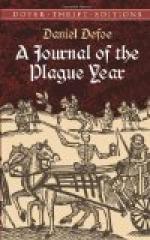This stagnation of our manufacturing trade in the country would have put the people there to much greater difficulties, but that the master workmen, clothiers, and others, to the uttermost of their stocks and strength, kept on making their goods to keep the poor at work, believing that, as soon as the sickness should abate, they would have a quick demand in proportion to the decay of their trade at that time; but as none but those masters that were rich could do thus, and that many were poor and not able, the manufacturing trade in England suffered greatly, and the poor were pinched all over England by the calamity of the city of London only.
It is true that the next year made them full amends by another terrible calamity upon the city; so that the city by one calamity impoverished and weakened the country, and by another calamity (even terrible, too, of its kind) enriched the country, and made them again amends: for an infinite quantity of household stuff, wearing apparel, and other things, besides whole warehouses filled with merchandise and manufactures, such as come from all parts of England, were consumed in the fire of London the next year after this terrible visitation. It is incredible what a trade this made all over the whole kingdom, to make good the want, and to supply that loss; so that, in short, all the manufacturing hands in the nation were set on work, and were little enough for several years to supply the market, and answer the demands. All foreign markets also were empty of our goods, by the stop which had been occasioned by the plague, and before an open trade was allowed again; and the prodigious demand at home falling in, joined to make a quick vent[306] for all sorts of goods; so that there never was known such a trade all over England, for the time, as was in the first seven years after the plague, and after the fire of London.
It remains now that I should say something of the merciful part of this terrible judgment. The last week in September, the plague being come to its crisis, its fury began to assuage. I remember my friend Dr. Heath, coming to see me the week before, told me he was sure the violence of it would assuage in a few days; but when I saw the weekly bill of that week, which was the highest of the whole year, being 8,297 of all diseases, I upbraided him with it, and asked him what he had made his judgment from. His answer, however, was not so much to seek[307] as I thought it would have been. “Look you,” says he: “by the number which are at this time sick and infected, there should have been twenty thousand dead the last week, instead of eight thousand, if the inveterate mortal contagion had been as it was two weeks ago; for then it ordinarily killed in two or three days, now not under eight or ten; and then not above one in five recovered, whereas I have observed that now not above two in five miscarry. And observe it from me, the next bill will decrease, and you will see many more people recover than used




